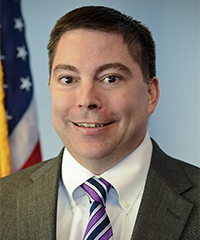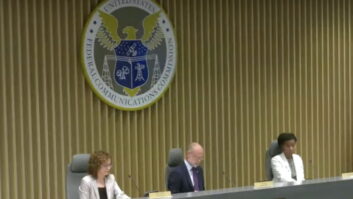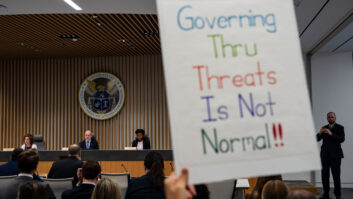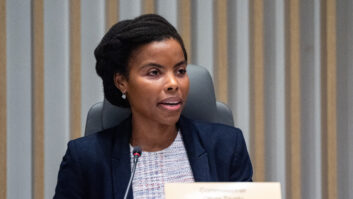 Commissioner Michael O’Rielly says rules created by the Federal Communication Commission to promote diversity in media have been a “complete failure.”
Commissioner Michael O’Rielly says rules created by the Federal Communication Commission to promote diversity in media have been a “complete failure.”
Speaking virtually to a luncheon audience of the Media Institute, the Republican commissioner said the “dearth” of African American ownership of local broadcast properties “is beyond embarrassing, resting in the low single digits.”
But he noted that the current state of affairs has occurred with FCC ownership limitations in place for decades.
“A very compelling case can be made that removing our limitations, in fact, would set the stage for more minority investment and ownership. Consider radio ownership, where allowing bigger clusters within a market could help stabilize, and alternately, enhance minority-owned stations in that market. Similarly, the same outcome could occur if the newspaper-broadcast limitations were struck as well, something the courts have approved numerous times, only to be foiled by claims of missing analysis.”
He credited Chairman Ajit Pai for leading an effort to adopt a radio incubator program that would entice broadcast owners to partner with minority small business entrepreneurs. “While supporting this initiative, I was unfortunately unsuccessful in my effort to extend the program to television as well,” he said.
“Alas, the entire effort was upended by a few squabbling industry participants and then captured by the legal morass that is the quadrennial [review]. Now, we effectively have returned to the broken status quo. Absent Supreme Court intervention, it will be years before any action is even considered again at the commission.”
O’Rielly said this outcome “represents a huge disappointment for the agency and a lost opportunity for society.”
“Mind-Boggling”
About media rules more broadly, O’Rielly thinks the entire federal media regulatory model “needs to be shredded.”
“The level of overregulation is mind-boggling. Ask yourself: Why does the FCC regulate where a broadcast tower is placed so long as it doesn’t cause interference with an adjacent market? Or, why does the FCC prescribe how a station should maximize OTA listeners or viewers when it is already in the broadcaster’s best interest to do so?”
Many of his remarks were about TV but overlapped with radio concerns.
“For example, in reviewing mergers, the Department of Justice has repeatedly and inexplicably failed to properly identify relevant advertising market participants,” O’Rielly said.
“We have seen the data. There is no question that in DMAs across the country, urban and rural, certain high-tech companies are taking an increasing share of local advertising. Yet, when, God forbid, two television or two radio stations in a market seek to combine, DOJ absolutely refuses to consider the existence of non-broadcast ad sales in its overall analysis.”
And he opined on the First Amendment, criticizing “certain opportunists” who claim to advocate for the amendment “but who are only willing to defend it when convenient and constantly shift its meaning to fit their current political objectives.”
He said, “We should all reject demands, in the name of the First Amendment, for private actors to curate or publish speech in a certain way. I shudder to think of a day in which the Fairness Doctrine could be reincarnated by some other name, especially at the ironic behest of so-called speech ‘defenders.’”
And he said the amendment’s protections apply to corporate entities, “especially when they engage in editorial decision making. It is time to stop allowing purveyors of First Amendment gibberish to claim they support more speech, when their actions make clear that they would actually curtail it through government action.”
O’Rielly’s nomination was recently approved by the Senate Commerce Committee and is awaiting action by the Senate. He is one of three Republicans on the five-member commission.







